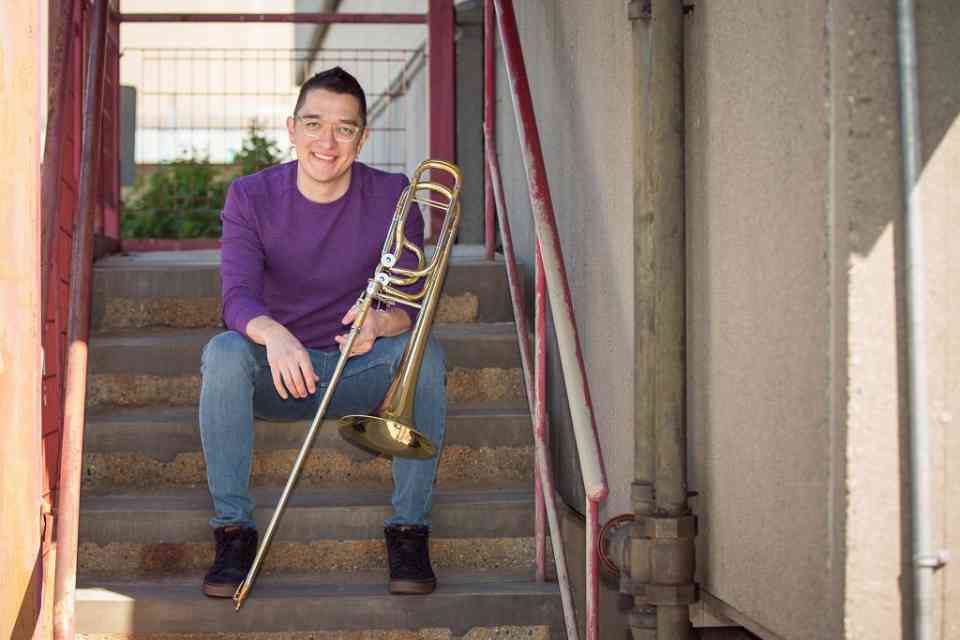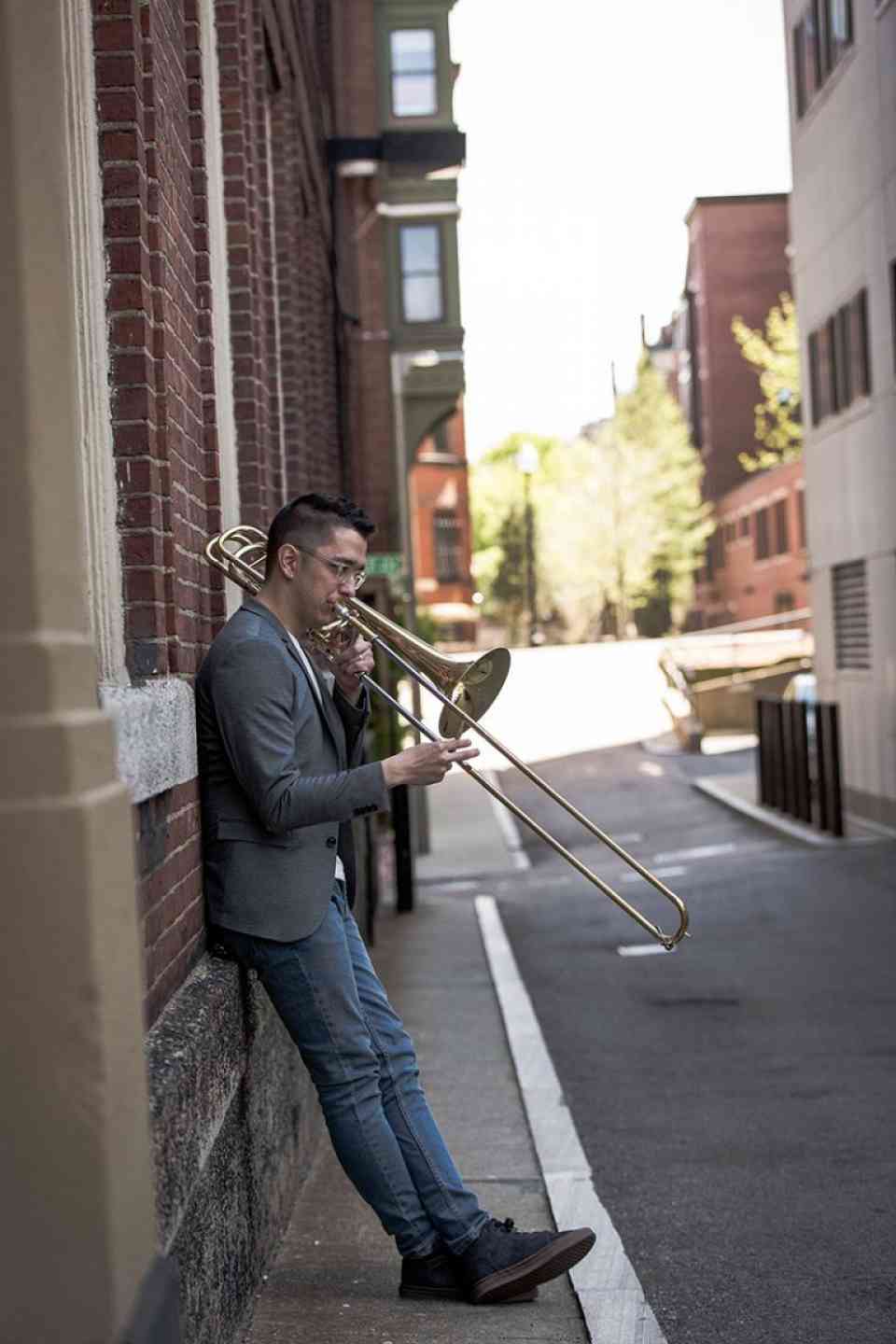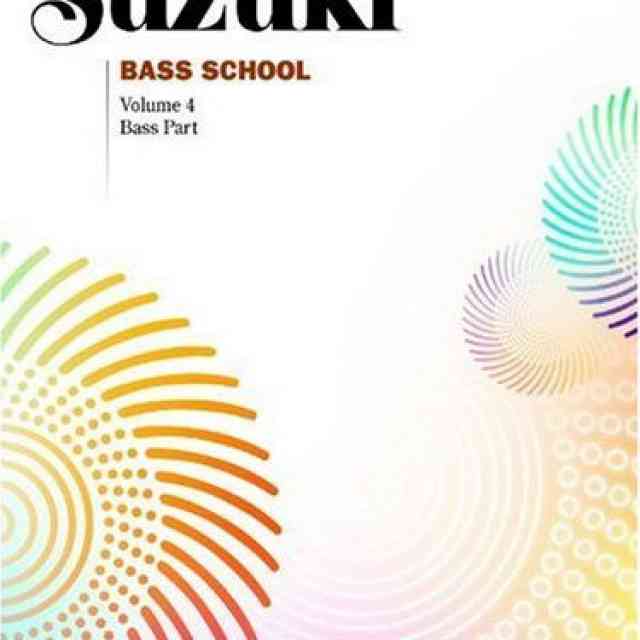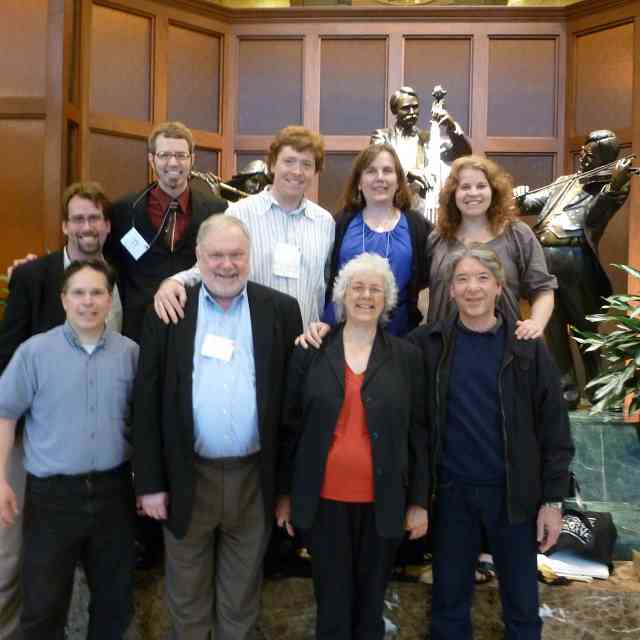Editor’s Note:
In this issue, ASJ introduces a new column, “Spotlight,” which will feature in each issue a notable Suzuki graduate, supporter, or community member who the wider Suzuki community may not be aware of. Our hope is to create a continuing conversation about the Suzuki method’s influence in individual’s lives, and by extension, its benefits to wider society. If you would like to suggest a subject for future “Spotlight” columns, please email [javascript protected email address]

Matt Jefferson
You started out as a young Suzuki piano student and are now a professional bass trombonist. Share that journey with us.
I would love to tell you about some amazing story of perseverance over adversity, but I think my story is pretty straightforward and normal. I grew up in London, Ontario, Canada, which is where all of my Suzuki experience happened. I started playing piano at a Suzuki school called the Children’s Talent Education Centre (CTEC) at the age of three. My teachers were Dorothy Jones and after a few years, her son David Jones. Nothing really felt special or different about my life when compared to other kids—I played baseball, I was a good student, and I took piano lessons. That pretty much described each and every one of my friends, too. It wasn’t until moving to Calgary, Alberta, when I was 11 that I stopped taking piano lessons, and I finished Suzuki Books Six and Seven on my own. By the time I got to middle school band, I had pretty much completed the Suzuki curriculum. I would also say that was the point where I started to see how much my musical background set me apart, when looking at other band kids. Again, most of my band friends had taken piano lessons for several years, but I was by far the most accomplished. Even though a lot of them were still taking lessons, I could still play the most advanced music (stuff from Book Six or Seven). It didn’t feel challenging, it was just what I had learned to play.There were other things that I couldn’t play—Beethoven’s Moonlight Sonata was a common one that my friends would learn that I never had. So I just assumed that this is how things were—I would be good at some things and bad at others. I was an okay trombone player; in grade seven they placed me in the top band with ninth graders, but I was by no means blowing anyone away with my incredible skill. I could play all the same notes that the older kids could, but by the time I was in grade nine, all the other guys in the section kind of sounded like me. I could do some things better, but they could do other things better than me too. No big deal.
The first time that I was ever blown away by the talent of one of my peers was when I started high school. Carl Lundgren and I started at the same time and he was amazing. He was the one who informed me that I had perfect pitch. The band director asked the class if anyone had perfect pitch. I didn’t know what that was, so I just looked around the class to see who raised their hand. Carl did, but told everyone that I was the one who had it. I was super surprised until Mr. Uzick (the band director) then walked over to the piano to “test” me. He played a note and asked me what it was. I told him. Everyone freaked out. I had no idea that not everyone could do that—my sister could as well—and I had never consciously considered pitch independently of music I had learned.
Carl was really proactive about getting involved in musical activities outside of school: the CalgaryYouth Orchestra, Kiwanis Festival, and the Mount Royal Conservatory Academy program. He dragged me along into each as well; I was more focused on baseball and never thought I was good enough on trombone to do them, so it was really because of his urging that I auditioned for all these and eventually got in. He eventually chose to audition at the University of North Texas, which had a strong trombone studio, but I didn’t think I could get into an American school. He pointed out that I had nothing to lose, and my parents agreed, so we both went down to audition and both got in.
I think what the Suzuki program helped me to do is not to look at musical skill like a “talent” or a “special ability.” I was a part of the community and the strong musical environment enabled me to unlock elements within myself that most people can’t/don’t access because of the limitations of the traditional music lesson setting. Seeing your friends and siblings do things, constantly listening to live music, and feeling free to interact with other students and teachers has infinitely more potential opportunities arise than a one-on-one lesson between a student and a teacher.
Do you have a personal motto?
Not an articulated one, no, but I suppose it would be something like, “Music first, everything else follows—form follows function.”
Tell us about your musical life when you were a child.
My sister, who is three years older than me, began the Suzuki violin program the same year that I was born. My mom was a Suzuki piano teacher as well. I was always involved in baby classes with my parents, hearing my sister practice, being surrounded by friends and family who played, listened, or simply supported music. I don’t remember a time where I didn’t hear some sort of live music growing up, whether it was me or my sister practicing, hearing my dad sing in the church choir, or going to CTEC where my mom taught lessons—my sister and I took lessons there too, although not from my mom—music was very much ingrained in our day-to-day lives. As we got a bit older, CTEC had a Celtic fiddle group in which my sister played and I accompanied the group on piano. It’s funny to type all this out and realize how much music shaped my childhood, because I really just felt like a normal kid. I didn’t live and die for music, I just went to places like CTEC because my parents took me there. Once there, I wasn’t magically drawn to the piano, I wanted to go play with my friends. They weren’t musical games we played, either; it was just regular kid stuff. I guess I feel that my musical career was shaped by my musical environment, and I just unconsciously absorbed it.

Matt Jefferson
What’s one thing you’ve learned from your Suzuki background that you wish others understood?
What I really love about my Suzuki background is how much emphasis is placed upon listening. Looking back and realizing that I can still remember and play some of the music I learned as a kid, and I can play a bunch of my sister’s violin music on the bass trombone, is kind of amazing. I don’t need the music; it’s just stuck in my brain. I remember sitting through CTEC performances and the piano and violin group classes. Sometimes I would be playing, other times I would be listening. Funnily enough, I remember hating them, but I had to sit there to support my sister and friends or else my mom would get mad. I would get so restless because I would have preferred to play baseball, run around, or doing something. Anything would have been better than being forced to sit there quietly, listening to classical music. In hindsight, what was actually going on during those moments was that I would be hearing the same music again and again and again, some of it played well and some of it played poorly, but my musical concept would just get stronger and stronger. I wasn’t working on technique for hours each and every day, I just listened. My process hasn’t changed now that I’m a professional, either. I just listen, and the technique takes care of itself.
Was practicing ever a struggle for you?
Yes, I hated practicing—I didn’t see the point. Sitting there trying to perfect something that I didn’t really care to perfect was tough. Eventually, I found a way that I could tolerate. On an Excel spreadsheet, I wrote out the name of every song in each Suzuki book as well as some of the other pieces that I had learned along the way. Then, I would randomize the titles and print out the sheet. I would set a timer for thirty minutes or an hour, and just start playing through them beginning to end. Once I finished a piece, I checked it off, and started the next one. When the timer went off, I was done practicing for the day.
Now that I’m older, I still struggle with practicing, but I’ve learned that setting clear, accomplishable goals is the way that works for me. I’m not a guy who enjoys sitting there for hours fine-tuning a three note passage, but now that I understandwhythat needs to be done, I can customize the practicing process accordingly.
What role do you feel arts education plays in character building?
I think it’s the most unappreciated component of character building in North America. Competition is celebrated through sports, education is celebrated through university degrees, family of course is maybe the most significant of them all, but the impact that the arts have on education is harder to define. As such, it seems like there is a never-ending reduction of arts funding from year to year. With that said, I think that in time the few who find a way to continue to educate youth through the arts will see an enormous difference of character between those who appreciate and those who do not.
If you could offer your younger Suzuki self or Suzuki students today any advice, what would it be?
Keep going! The Suzuki program is like a huge investment of time and energy, but investments pay off in the long run. Patience can be difficult for kids and the constant pressure of instant gratification that is pervasive in our society doesn’t make it any easier. But when you persevere through it all, you’ll be glad you did.
While Matt Jefferson is best known as the bass voice of the acclaimed trombone quartet Maniacal 4, his versatility extends to classical and commercial music as well. Equally versed on bass trombone, tenor trombone, and tuba, he has performed with the Louisiana Philharmonic, the Acadiana Symphony Orchestra, and the Grammy-nominated One O’Clock Lab Band.
A graduate of University of North Texas, Matt’s true passion is for teaching. He constantly tries to challenge the limitations of traditional institutionalized education to help students think outside the box and maximize their learning potential to achieve their goals. During his three years as an active freelancer in Louisiana, he was also a valued faculty member of Nicholls State University.
A forward-thinking “people person,” Matt is an ardent student of life. In addition to his music career, he does freelance video production. He also is an enthusiastic sports fan and self-confessed bookworm whose tastes range from Malcolm Gladwell to Christopher Moore. Originally from London, Ontario, Matt grew up in Calgary and now lives in Chicago with his wife and two cats.
Photos by Matt Wan








